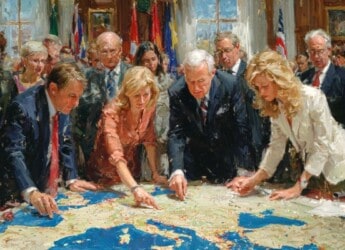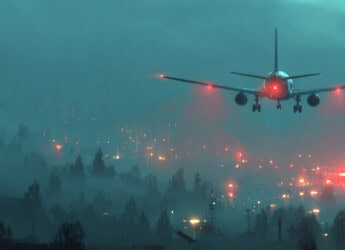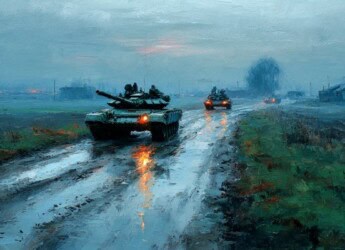Editor’s Note: As the Russia-Ukraine conflict enters its third year, this article provides a snapshot of the situation as of July 6, 2024. We cover recent diplomatic moves, including Hungarian Prime Minister Orban’s mediation attempts, alongside military developments such as Russian advances and Ukrainian counterstrikes. The ongoing impact on civilians and international responses is also examined. This overview aims to give readers a comprehensive understanding of the conflict’s current state and its wider implications.
For those seeking to grasp the full scope of this evolving landscape, the complete updates from the Institute for the Study of War serve as an invaluable resource.
Content Assessment: Orban's Peace Gambit: Diplomacy and Conflict in the Evolving Russia-Ukraine War
Information - 93%
Insight - 92%
Relevance - 90%
Objectivity - 91%
Authority - 93%
92%
Excellent
A short percentage-based assessment of the qualitative benefit expressed as a percentage of positive reception of the recent update on the Russo-Ukrainian conflict as reported by ComplexDiscovery OÜ and sourced from the Institute for the Study of War.
Background Note: ComplexDiscovery’s staff offers distinctive perspectives on the Russo-Ukrainian war and Iran-Israel conflict, informed by military experience on the West German, East German, and Czechoslovakian border during the Cold War and in Sinai as part of Camp David Accord compliance activities. This firsthand regional knowledge has been further enhanced by recent staff travels to Eastern European countries, including Estonia, Latvia, Lithuania, and Poland. These visits have provided up-to-date, on-the-ground insights into the current geopolitical climate in regions directly impacted by the ongoing conflict.
Combined with proficiency in cybersecurity, information governance, and eDiscovery, this multifaceted experience enables comprehensive analysis of these conflicts, including the critical impact of cyber warfare, disinformation, and digital forensics on modern military engagements. This unique background positions ComplexDiscovery to provide valuable insights for conflict-related investigations and litigation, where understanding the interplay of technology, data, and geopolitical factors is crucial.
Russo-Ukrainian Conflict Update
Orban’s Peace Gambit: Diplomacy and Conflict in the Evolving Russia-Ukraine War
ComplexDiscovery Staff
As we enter the third year of the Russia-Ukraine conflict, the situation remains as complex and volatile as ever. Let’s break down the latest developments across diplomatic, military, and civilian fronts as of July 6, 2024.
On the diplomatic stage, an unexpected player has emerged: Hungarian Prime Minister Viktor Orban. In a whirlwind of diplomacy, Orban visited Kyiv on July 2 and Moscow on July 5. He followed this up with a provocative op-ed in Newsweek on July 5, accusing NATO of choosing conflict over peace. Orban seems to be positioning himself as a potential mediator, pushing for a shift in European focus from military support to peace talks. However, given Russian President Vladimir Putin’s consistent lack of interest in negotiations that don’t result in Ukraine’s capitulation, Orban’s efforts face significant hurdles.
Meanwhile, Ukraine is assertively pursuing its own peace initiatives, showcasing a proactive stance in diplomatic efforts. In mid-June 2024, they successfully concluded the first of several planned international summits, hosting representatives from countries and major international organizations in Switzerland. The primary objective of these summits is to establish concrete conditions for future negotiations that could pave the way for a lasting peace on Ukraine’s terms. This series of diplomatic engagements represents a significant effort to shape the narrative and outcomes of any potential peace process. The summit resulted in a comprehensive Joint Peace Communique, signed by over 80 partner countries and international organizations. This document strongly reaffirms their unwavering support for Ukraine’s sovereignty and territorial integrity within its internationally recognized borders. It also outlines key principles for future negotiations, including the complete withdrawal of Russian forces from all Ukrainian territory, security guarantees, and plans for post-war reconstruction. By taking the lead in these discussions, Ukraine aims to build a robust international coalition committed to its vision of peace, ensuring that any future talks will be approached from a position of strength and broad global backing.
Russian forces have been making notable advances in several key areas on the battlefield. Geolocated footage shows recent Russian progress near Kupyansk, Siversk, and Avdiivka. In a potentially significant development, Russian forces likely seized the town of Sokil, northwest of Avdiivka in the Donetsk region. This could pose a threat to Ukrainian supply lines. However, these gains aren’t coming cheap – reports indicate high casualty rates among Russian troops.
Ukrainian forces continue to conduct strikes deep inside Russian territory. On the night of July 5-6, 2024, Ukrainian drones targeted energy infrastructure in Krasnodar Krai. The Krasnodar Krai Operational Headquarters reported that Russian forces shot down Ukrainian drones near Leningradskaya, Yeysk and Pavlovskaya. However, falling debris from these drones caused damage to a cell phone tower in Yeysk and started a fire at an oil depot in Pavlovskaya. Additionally, a fuel tank in Leningradskaya was reportedly struck by Ukrainian drones. These strikes demonstrate Ukraine’s capability to project force beyond the immediate frontlines and disrupt Russian logistics and infrastructure. The attacks on energy facilities in Krasnodar Krai, which is located far from the front lines, highlight the expanding geographical scope of the conflict and Ukraine’s ability to strike strategic targets within Russia.
Both sides are also maneuvering strategically off the battlefield, with significant developments in information control and economic policy. Russia is intensifying its grip on information flow, as evidenced by the federal censor Roskomnadzor’s July 4, 2024 decision to block access to 25 mobile virtual private network (VPN) services. This move, part of a broader crackdown on independent information sources, aims to isolate the Russian population from content deemed contrary to state interests, particularly regarding the war in Ukraine. It represents a significant escalation in Russia’s ongoing efforts to control its internal narrative. On the economic front, Russia and Iran signed a comprehensive bank agreement on July 4, 2024, enabling direct trade in rubles and rials. This arrangement covers various economic activities, from energy trades to agricultural products, and represents a concerted effort to circumvent Western sanctions. By creating alternative economic structures less reliant on Western currencies, both countries attempt to insulate themselves from international financial pressures. These moves highlight how the conflict’s impact extends far beyond the immediate war zone, reshaping information landscapes and global economic relationships.
As we look ahead, the path to resolution remains unclear. The conflict continues to evolve, with both sides adapting their strategies in response to changing circumstances. The international community watches closely, hoping for a resolution that respects Ukraine’s sovereignty while bringing an end to the ongoing hostilities.
News Sources
- Institute for the Study of War (understandingwar.org)
- Russia-Ukraine war: List of key events, day 863
- Current Events Archives – ComplexDiscovery
As a leading source for cybersecurity, information governance, and legal discovery insights, including international investigations and litigation, ComplexDiscovery OÜ recognizes the importance of awareness regarding alleged and documented criminal acts, particularly in the context of the Russia-Ukraine conflict. While we, following the lead of the Institute for the Study of War (ISW), do not provide detailed coverage of war crimes in our primary reports, we encourage professionals within the eDiscovery ecosystem to stay informed about these activities. This awareness is crucial for understanding potential future legal actions and responsibilities.
Detailed Reporting with Maps for July 6, 2024, from the ISW – Mouseover to Scroll
Ukraine Campaign Assessment - July 6, 2024Review the Detailed Reporting and Maps PDF
About the Institute for the Study of War Research Methodology
ISW’s research methodology relies on both primary and secondary sources, enabling researchers to develop a comprehensive understanding of the situation on the ground. In order to analyze military and political developments in any given area, ISW’s research analysts must wholly understand the systems of enemy and friendly forces. They must also understand the population demographics, physical terrain, politics, and history of that area. This lays the analytical foundation for understanding the reasons for particular developments and fulfilling their assigned research objectives. ISW analysts also spend time in places like Iraq, Afghanistan, and elsewhere in order to gain a better understanding of the security and political situation and to evaluate the implementation of current strategies and policies. Our researchers compile data and analyze trends, producing a granular analysis of developments in areas of research, producing an accurate, high-resolution, timely, and thorough picture of the situation. ISW’s research methodology guarantees its success and commitment to improving the nation’s ability to execute military operations, achieve strategic objectives, and respond to emerging problems that may require the use of American military power.
About the Institute for the Study of War
The Institute for the Study of War advances an informed understanding of military affairs through reliable research, trusted analysis, and innovative education. We are committed to improving the nation’s ability to execute military operations and respond to emerging threats in order to achieve U.S. strategic objectives. ISW is a non-partisan, non-profit, public policy research organization.
Learn more, get involved, and contribute today.
Additional Reading
- From Dissent to OSINT? Understanding, Influencing, and Protecting Roles, Reputation, and Revenue
- [Annual Update] International Cyber Law in Practice: Interactive Toolkit
- Data Embassies: Sovereignty, Security, and Continuity for Nation-States
Assisted by GAI and LLM Technologies
* Sourced and shared with direct express permission from the Institute for the Study of War (ISW).
Source: ComplexDiscovery OÜ


























